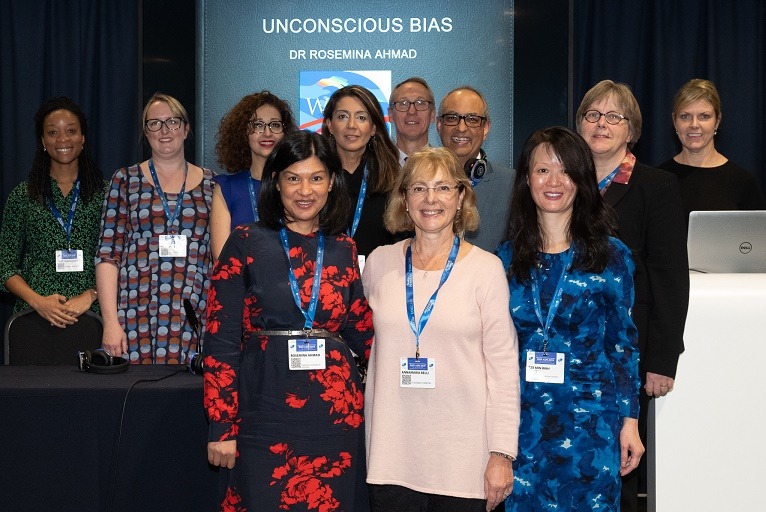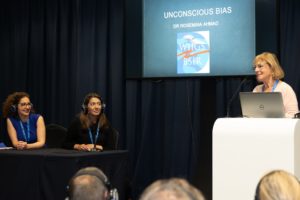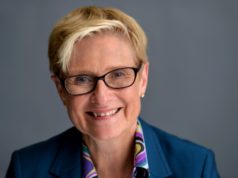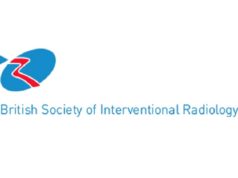
The BSIR women and diversity committee formally launched the Professor Anna Maria Belli Travelling Grant on 14 November, at the 2019 annual scientific meeting of the British Society of Interventional Radiology (BSIR; 13–15 November, Manchester, UK). The launch took place during the first ever women and diversity networking luncheon to be hosted at the annual congress.
Speaking to Interventional News at the launch, the grant’s namesake, Anna Maria Belli (recently retired from St George’s University Hospitals NHS Foundation Trust, London, UK), commented: “More than half of medical graduates are female, yet we still do not have them entering interventional radiology (IR), because they perceive it as a very male-dominated specialty. Women make fantastic interventional radiologists. They bring a different perspective and have a healthy team approach, and we really need to attract them for our specialty to thrive.”
BSIR women and diversity committee co-chair Fiona Miller (King’s College Hospital NHS Foundation Trust, London, UK) shared Belli’s enthusiasm, saying: “I am delighted that the BSIR committee decided to support this grant to promote interventional radiology, while carrying the message that everyone is welcome to join our team.”
Tze Wah (The Leeds Teaching Hospitals NHS Trust, Leeds, UK), also BSIR women and diversity committee co-chair, added: “It has been a real privilege to celebrate this amazing milestone with professor Anna Maria Belli. We would like to spread this magical ripple forward, and I believe we can change the landscape for women in interventional radiology, and increase the colour in our IR community. All good standing BSIR members can apply for it [the grant], so they can go out and promote diversity in IR.”
Funds from the Professor Anna Maria Belli Travelling Grant will be used to cover second class travel expenses for individual lecturers to deliver talks to medical students, junior doctors, and consultants regarding women in IR, diversity and recruitment. One night’s accommodation, if necessary and at “reasonable costs”, may also be included.
According to BSIR, the purpose of the travelling grant “is to showcase IR, facilitate access to female and other role models, allowing trainees the opportunity to discuss as well as ask sensitive questions relating to a career in IR. The hope would be that these visits would in addition result in informal/ formal point of contact that would blend with our vision to commence a mentoring programme.”
Applicants must be UK-based IR consultants, a current member of BSIR, have a track record of teaching and education, and submit a statement explaining what the lecture would be based on. The women and diversity committee will then review applications and select the grant recipients.
Raman Uberoi (Oxford University Hospitals NHS Foundation Trust, Oxford, UK), another member of the BSIR women and diversity committee, explained the importance of the grant to this newspaper: “What we need are role models; we need mentors who are going to inspire people, give them the opportunity to see interventional radiologists as being an embracing community of like-minded doctors who are using image-guiding treatments. Having this diversity group [the women and diversity committee] means we are inclusive, we are trying to bring everybody into IR who is interested in treating patients using minimally invasive techniques, regardless of their gender, ethnicity, or orientation—that should not be the issue. The only issue is that they are keen on patient care, on improving outcomes, on quality and safety, and really, getting the best results for our patients. Having people who are going out from the BSIR demonstrating that we are very open and receptive to any ethnicity, any gender, is important. We want them to become skilled in interventional radiology, ultimately to provide the best possible care for our patients.”

During the official launch of the travelling grant, incoming BSIR women and diversity committee chair Rosemina Ahmad (University Hospitals of Leicester NHS Trust, Leicester, UK) spoke on unconscious bias in interventional radiology. In her presentation, she highlighted how innate human unconscious bias was seeping into machine learning algorithms, warning: “Early evidence shows that unconscious bias is magnified by artificial intelligence. We need to be aware of this, because this is shaping the future.”
The BSIR women and diversity committee, and the new Professor Anna Maria Belli Travelling Grant, hope to address both unconscious and conscious biases facing women and marginalised groups interested in a career in interventional radiology. The ultimate goal, Elika Kashef (Imperial College Healthcare NHS Trust, London, UK) explained, is to further the conversation around diversity so that it goes beyond “simply celebrating being a woman, for example, and an interventional radiologist”, but matures to the point when the discipline is so inclusive for its diversity to be unremarkable.










